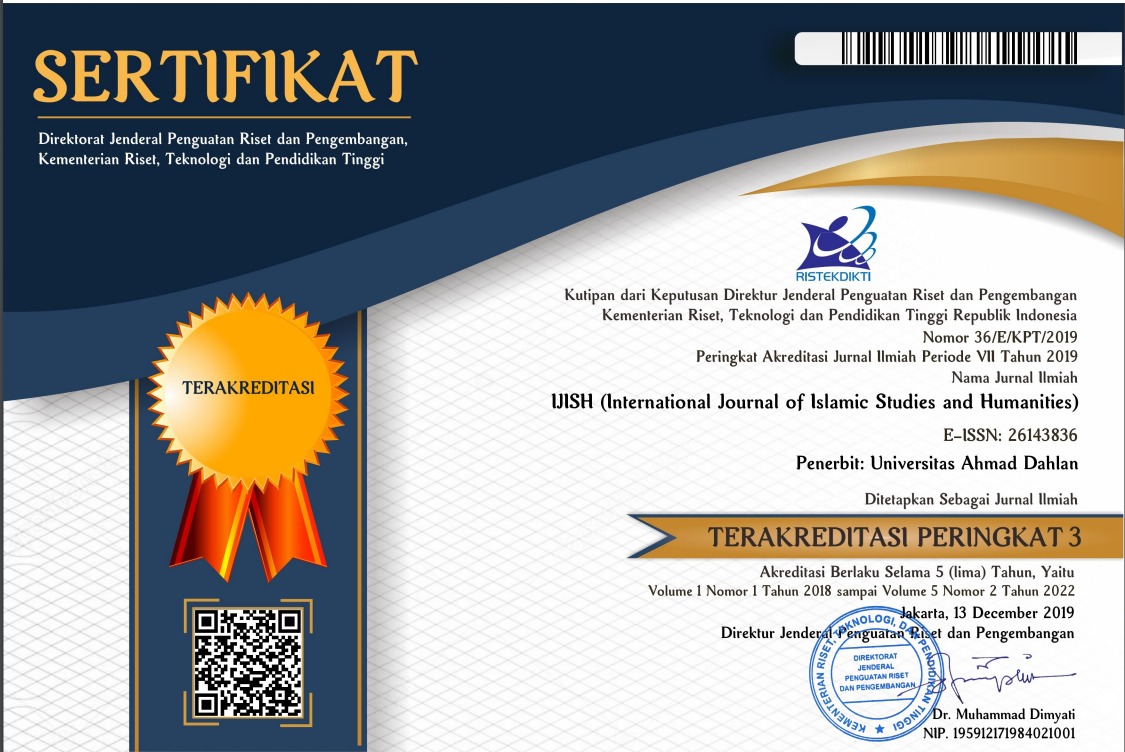Interpretation of Hermeneutics and Religious Normativity: Hermeneutic Approach in Scientific Studies in the Islamic World
DOI:
https://doi.org/10.26555/ijish.v2i1.535Keywords:
hermeneutics, science, IslamAbstract
The clergy has long used the method of hermeneutics in the 17th century to interpret classical texts in meaning. Because of this, in the study of scientific knowledge, Islam tries to use hermeneutical interpretations to find a definition that can be understood easily by humans. So the need to research the above issues to find formulations and hermeneutic methods in Islamic scholarship that not only consists of the holy book of the Qur'an and al-Hadith as authentic texts but also thoughts, culture, fiqh, theology and fields of science others in Islam. This research method is a study with a type of literature study (literature study) with a philosophical-historical approach — data collection techniques with documentation techniques. The results of the survey show that Muslim scholars such as Amin Abdullah try to use the hermeneutic method in Islamic studies to produce scientific assumptions in Islamic studies in the following subjects: First, the nature of knowledge summarized in various studies is not fixed and static, but dynamic. Second, the thinking carried out by the scholars' is the result of the interaction between the text (al-Qur`an and Sunnah) and the social context that surrounds it. Third, full emphasis on the empirical-critical paradigm for conducting religious reviews, including thoughts about the sacredness of the text itself, and the results of that thought is not fixed but always changing.References
Abdullah, A. (1996). Studi Agama: Normativitas atau Historisitas? Yogyakarta: Pustaka Pelajar.
al-Barry, M., & Partanto, P. (2001). Kamus Ilmiah Populer. Surabaya: Arkola.
Baharun, H. (2011). Metodologi Studi Islam: Percikan Pemikiran Tokoh dalam Membumikan Agama. Yogyakarta: Ar-Ruzz Media.
Bertens, K. (1981). Filsafat Barat Abad XX. Jakarta: Gramedia.
Bleicher, J. (1980). Contemporary Hermeneutics. London: Routledge & Kegan Paul.
Connolly, P. (2016). Pendekatan Aneka Studi Agama. Yogyakarta: IRCiSoD dan LkiS.
Endraswara, S. (2009). Metodologi Penelitian Folklor. Yogyakarta: Media Pressindo.
Hanafi, H. (2003). Liberalisasi, Revolusi, Hermeneutik. Yogyakarta: Prisma.
Hardiman, F. (2012). Melampaui Positivisme dan Modernitas. Yogyakarta: Kanisius.
Husaini, A. (2007). Hermeneutika dan Tafsir al-Qur`an. Jakarta: Gema Insani Press.
Indonesia, K. P. (1998). Kamus Besar Bahasa Indonesia. Jakarta: DPKRI.
Kafrawi, S., & Mustaqim, A. (2009). Upaya Integrasi Hermeneutika dalam Studi al-Qur`an dan Hadits (Teori dan Aplikasi). Yogyakarta: Institut Penelitian UIN Sunan Kalijaga.
Kartodirjo, S. (1992). Pendekatan Ilmu Sosial dalam Metodologi Sejarah. Jakarta: PT Gramedia Pustaka Utama.
Margono, S. (2010). Metodologi Penelitian Pendidikan. Jakarta: PT Rineka Cipta.
Martono, N. (2014). Metode Penelitian Kuantitatif: Analisis Isi dan Analisis Data Sekunder. Jakarta: PT Raja Grafindo Persada.
Palmer, R. (2005). Hermeneutika: Teori Baru Mengenai Interpretasi. Yogyakarta: Pustaka Pelajar.
Rahman, F. (1985). Islam and Modernitas. Bandung: Pustaka.
Semi, M. (1993). Metode Penelitian Sastra. Bandung: Aksara.
Sibawaihi. (2007). Hermeneutika al-Qur`an Fazlur Rahman. Yogyakarta: Jalasutra.
Sugiyono. (2006). Mtode Penelitian Pendidikan (Kuantitatif, Kualitatif, Pendekatan R & D). Bandung : Alfabeta.
Sumaryono, E. (2000). Hermeneutika: Suatu Metode Filsafat. Yogyakarta: Kanisius.
Volmer, M. (1992). The Hermeneutics Reader. New York: Continum.
al-Barry, M., & Partanto, P. (2001). Kamus Ilmiah Populer. Surabaya: Arkola.
Baharun, H. (2011). Metodologi Studi Islam: Percikan Pemikiran Tokoh dalam Membumikan Agama. Yogyakarta: Ar-Ruzz Media.
Bertens, K. (1981). Filsafat Barat Abad XX. Jakarta: Gramedia.
Bleicher, J. (1980). Contemporary Hermeneutics. London: Routledge & Kegan Paul.
Connolly, P. (2016). Pendekatan Aneka Studi Agama. Yogyakarta: IRCiSoD dan LkiS.
Endraswara, S. (2009). Metodologi Penelitian Folklor. Yogyakarta: Media Pressindo.
Hanafi, H. (2003). Liberalisasi, Revolusi, Hermeneutik. Yogyakarta: Prisma.
Hardiman, F. (2012). Melampaui Positivisme dan Modernitas. Yogyakarta: Kanisius.
Husaini, A. (2007). Hermeneutika dan Tafsir al-Qur`an. Jakarta: Gema Insani Press.
Indonesia, K. P. (1998). Kamus Besar Bahasa Indonesia. Jakarta: DPKRI.
Kafrawi, S., & Mustaqim, A. (2009). Upaya Integrasi Hermeneutika dalam Studi al-Qur`an dan Hadits (Teori dan Aplikasi). Yogyakarta: Institut Penelitian UIN Sunan Kalijaga.
Kartodirjo, S. (1992). Pendekatan Ilmu Sosial dalam Metodologi Sejarah. Jakarta: PT Gramedia Pustaka Utama.
Margono, S. (2010). Metodologi Penelitian Pendidikan. Jakarta: PT Rineka Cipta.
Martono, N. (2014). Metode Penelitian Kuantitatif: Analisis Isi dan Analisis Data Sekunder. Jakarta: PT Raja Grafindo Persada.
Palmer, R. (2005). Hermeneutika: Teori Baru Mengenai Interpretasi. Yogyakarta: Pustaka Pelajar.
Rahman, F. (1985). Islam and Modernitas. Bandung: Pustaka.
Semi, M. (1993). Metode Penelitian Sastra. Bandung: Aksara.
Sibawaihi. (2007). Hermeneutika al-Qur`an Fazlur Rahman. Yogyakarta: Jalasutra.
Sugiyono. (2006). Mtode Penelitian Pendidikan (Kuantitatif, Kualitatif, Pendekatan R & D). Bandung : Alfabeta.
Sumaryono, E. (2000). Hermeneutika: Suatu Metode Filsafat. Yogyakarta: Kanisius.
Volmer, M. (1992). The Hermeneutics Reader. New York: Continum.
Downloads
Published
2019-04-14
How to Cite
Sya’bani, M. A. Y. (2019). Interpretation of Hermeneutics and Religious Normativity: Hermeneutic Approach in Scientific Studies in the Islamic World. IJISH (International Journal of Islamic Studies and Humanities), 2(1), 11–21. https://doi.org/10.26555/ijish.v2i1.535
Issue
Section
Articles
License
Authors who publish with IJISH (International Journal of Islamic Studies and Humanities) agree to the following terms:
- Authors retain copyright and grant the journal right of first publication with the work simultaneously licensed under a Creative Commons Attribution License (CC BY-SA 4.0) that allows others to share the work with an acknowledgment of the work's authorship and initial publication in this journal.Â
- Authors are able to enter into separate, additional contractual arrangements for the non-exclusive distribution of the journal's published version of the work (e.g., post it to an institutional repository or publish it in a book), with an acknowledgment of its initial publication in this journal.
- Authors are permitted and encouraged to post their work online (e.g., in institutional repositories or on their website) prior to and during the submission process, as it can lead to productive exchanges, as well as earlier and greater citation of published work.

This work is licensed under a Creative Commons Attribution-ShareAlike 4.0 International License.






